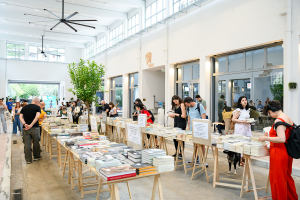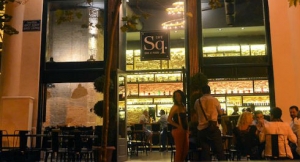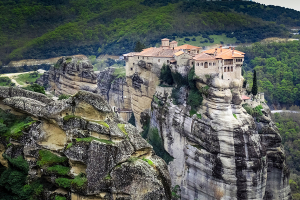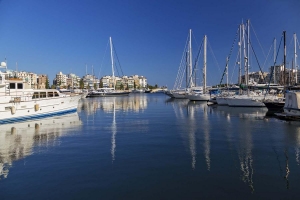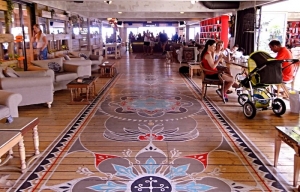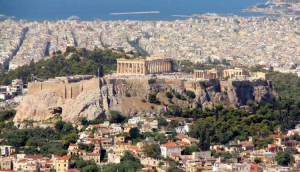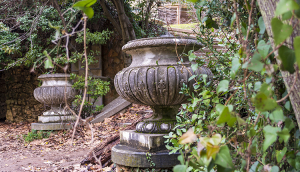BUSINESS CENTRE
XpatAthens
June At The Municipal Market of Kypseli
Events
Athens Wine Selfie
This Is Athens City Festival and Wine Style present for the first time in Athens, Athens Wine Selfie, a unique journey into the wonderful world of wine. A two-day wine celebration at the Municipal Market of Kypseli for both connoisseurs and amateur wine lovers, where we taste iconic labels from local and global wine production to the sounds of acclaimed music producers.
- Sunday, 2/6 & Monday, 3/6 || 17:00-22:00
- Atrium
- Free Entry
The third season of this theatrical journey concludes this month! In "Next Stop: Kypseli," we travel back in time and watch Kypseli come to life before our eyes during a Sunday walking tour that reveals the secrets and stories hidden behind every corner of the neighborhood.
- Sundays, 2/6, 9/6, 16/6, 23/6, 30/6 || 20:00-21:10
- Sundays, 16/6, 23/6, 30/6 || 23:00-24:10
- Meeting Point: Municipal Market of Kypseli / Exhibition Entrance on Fokionos Negri
- Regular ticket: €7 per tour. Reduced ticket: €5 for unemployed, students, people with disabilities, and seniors 65+
- Ticket pre-sale HERE!
The HOME Project Community Building Event
For the past seven years, The HOME Project has built bridges of cooperation and understanding, creating an inclusive and supportive community in the heart of Athens. On Tuesday, June 4th, at 18:00, we celebrate this community with music and dance by HipHop4Hope, skateboarding lessons by Free Movement, artistic activities, and homemade food cooked by the organization's shelters.
- Tuesday, 4/6, 18:00-21:00
- Atrium
- Free Entry
Farmers' Market
Market with fresh natural and organic products from small producers.
- Every Wednesday || 14:00-17:00
- Atrium
- Free Entry
10 Years of Concerts
A journey with beloved artists through the lens of photographer George Spanos. From Manos Eleftheriou to Miltos Paschalidis and from the Odeon of Herodes Atticus to the Municipal Market of Kypseli. A photographic journey that comes to life on June 9 & 10 at the Municipal Market of Kypseli.
- Sunday, 9/6 & Monday, 10/6 || 11:00-23:00
- Atrium
- Free Entry
Health Check
If you’re passing by the Municipal Market of Kypseli, take a quick test! The market regularly collaborates with the Prevention & Sexual Health Center Checkpoint, offering quick, free, confidential tests for HIV and hepatitis B & C. On Monday, June 10th, from 11:00-15:00, the specialized staff of Athens Checkpoint will be at Creative Lab 2 of the Municipal Market of Kypseli, providing tests for all sexually active individuals and informing the public about sexual health, supported by the AIDS Healthcare Foundation.
- Monday, 10/6 || 11:00-15:00
- Creative Lab 2
- Free Entry
Blood Donation
With the initiative of the Municipal Market of Kypseli, Blood-e organizes an action to support voluntary blood donation.
- Tuesday, 11/6 || 16:00-19:00
- Creative Lab 1
- Free Entry
Agra Publications at the Municipal Market of Kypseli
From Friday, June 14th, the Municipal Market of Kypseli will be filled with books from Agra Publications. For three days, 600 titles (fiction, poetry, essays, crime novels, photo and art albums, children’s books, ancient Greek and Byzantine literature) will be available at incredible prices.
- Friday, 14/6 & Saturday, 15/6 || 09:00-21:00 Sunday, 16/6 || 11:00-20:30
- Atrium
- Free Entry
Book Presentation: Gender Without Identity
Gender Without Identity offers an innovative and sometimes disturbing theory of gender formation. Rooted in Jean Laplanche's metapsychology and in conversation with bold work in queer and trans studies, authors Avgi Saketopoulou and Ann Pellegrini abandon the "core gender identity" to suggest that gender is something all subjects acquire – and that trauma sometimes plays a role in this acquisition.
- Monday, 17/6 || 18:30-21:30
- Atrium
- Free Entry
Our common home
Action for children taking place at the Municipal Market of Kypseli, as part of Refugee Week Greece, by the Babel Day Center. Each child participating will have the opportunity to depict themselves with colors on a piece of paper and then place themselves in their favorite room of a large house. All the 'miniatures' of the children will be placed inside the same house, coexisting, interacting, and sharing. The action is aimed at children aged 4-10. Coordinators: Eva Malaktari, speech therapist, Georgia Gioka, occupational therapist.
- Tuesday 18/6 || 11:00-13:00
- Creative Lab 1
- Free Entry
Let's Move!
Action for adults taking place at the Municipal Market of Kypseli, as part of Refugee Week Greece, by the Babel Day Center. The rhythmic expression group of the Babel Day Center opens its doors for the first time to anyone who wants to try the exercises, games, and songs studied by members of the Babel Day Center with the dance anthropologist Natasha Martin and other invited artists. Through exercises, rhythmic games, melodies, and dance therapy exercises, we will become a group, socialize, and connect better with our bodies, ourselves, and those around us. The event is linked to the theme of the refugee week, as we seek to find the home within us, in the body and in the environment we are in now. The action, supported by the Stavros Niarchos Foundation, is accessible and open to everyone over 18 years old.
- Tuesday 18/6 || 11:00-13:00
- Atrium
- Free Entry
The Municipal Market of Kypseli welcomes the Bantu Dancers who will introduce you to the fun world of AFROfitness, a type of fitness with Afro Dance elements that gives the feeling of a party! AFROfitness is a fitness program that combines traditional African dance moves of intensity and duration with contemporary dance expressions, developing fluidity, greater range of motion, as well as a richer and more authentic movement. Through AFROfitness, different dance expressions inspired by African traditions are explored and it is an excellent exercise for the whole body. A fun way to build self-confidence, improve and build endurance and physical coordination.
- Tuesday 18/6 || 19:00-20:30
- Atrium
- Free Entry, reservations HERE!
The Greek Council for Refugees and the Rosa Luxembourg Foundation present the field research on Reception and Asylum conditions in Greece through the experiences and words of refugees.
- Wednesday 19/6 || 19:00-21:00
- Atrium
- Free Entry
#WECONNECTATHENS
The #WECONNECTATHENS, the celebration of volunteering and Civil Society, comes to the Municipal Market of Kypseli on Friday, June 21st at 18:00. Get ready to meet new friends, have fun with interactive games, workshops, and create unforgettable memories! Don't miss the opportunity to participate in this unique event that marks the end of Festival 11!
- Friday 21/6 || 18:00-23:00
- Atrium
- Free Entry
Athens Cocktails comes to the Municipal Market of Kypseli with a musical event where well-known bartenders of the city present their favorite cocktails, for only €6.
- Saturday 22/6 || 15:00-23:00
- Atrium
- Free Entry
The pioneering educational music program of El Sistema Greece in collaboration with Blend Mishkin takes place from June 25 to 27 and brings together 30 children and adolescents aged 10-16 from every part of Athens, without any distinction or limitation, with or without musical knowledge. At the grand closing concert of the program, with the participation of all its students, the emerging talents of hip hop will take the stage and present their original musical creations to the audience, their skills in scratching and breakdance through an impressive choreography, as well as in graffiti through the work they will create and will be the scenery of the concert. The teachers of the children Blend Mishkin, BNC The Disco Vampire, and DJ Marble will also participate in the concert, setting the tone of the evening and captivating us with their rhythms.
- Thursday 27/6 || 20:00-21:00
- Atrium
- Free Entry
On Saturday, June 29, the Real Characters celebrate their 5 years of operation. For the celebration of this anniversary, they chose the vibrant space of the Municipal Market of Kypseli. A day full of enthusiasm and emotion, with the presentation of the pop-up store of the brand, DJ sets, live bands, delicious food, excellent coffee, refreshing drinks, and cocktails.
- Saturday 29/6 || 11:00-23:00
- Atrium
- Free Entry
ComicDom Bazaar - Summer 2024
Comicdom Bazaar returns to the Municipal Market of Kypseli, to make the summer of comics lovers even more beautiful, with many comics and related items!
- Sunday 30/6 || 11:00-21:00
- Atrium
- Free Entry
Connecting Families
The Municipal Market of Kypseli in collaboration with the Youth Center of AMKE IASIS and Connect Athens invite you to participate every Tuesday, 19:30-21:00, in a warm space of mutual support and learning, where parents, educators, and all those interested in the development of teenagers (aged 12-18), gather to share, learn, and empower each other. Through 6 weekly meetings, we will explore topics such as stress management, boosting children's self-esteem, and techniques for effectively intervening in difficult behaviors.
- Every Tuesday from 21/5 to 25/6 || 19:30-21:00
- Creative Lab 1
- Free admission, register HERE!
Digital Empowerment Workshop for 60+ The successful digital empowerment workshop returns to the Municipal Market of Kypseli, renewed and enriched! Using tablets, we learn to surf the internet, search for useful information, communicate with friends and relatives online, and conduct transactions with the government. No prior experience is required from participants (individuals aged 60+), just a willingness to learn!
- Every Wednesday from 1/5 to 12/6 || 10:00-12:00
- Creative Lab 1
- Cost: €50 for the 7-session cycle
- Tickets available HERE or at the physical ticket office (Creative Lab 1, Monday - Friday 11:00-14:00)
Learn some basic wood processing techniques by making your first project, an auxiliary stool that you can take home at the end of the class.
- Every Wednesday from 1/5 to 26/6 || 18:30-20:30
- Creative Lab 2
- Cost: €220 for the 8-session cycle Ticket pre-sale available HERE!
hōkō presents the easiest technique for plant propagation through water. Each participant will learn how to cut a plant and take it home at the end of the session. We also learn how to care for the cutting while it roots, and of course, how to transplant it into the soil.
- Wednesday 5/6 || 18:00-19:00
- Creative Lab 1
- Free admission, reserve your spot HERE!
Pan Pan strikes again with the 4th session of Kypseli Jam! This time, the jam isn't just about pencils, brushes, and inks; every third week, synthesizers, drum machines, and other gadgets join the mix. What do all these buttons do? How do these lights synchronize with the beat I'm making? How did my comic suddenly get a soundtrack? Find out at the Municipal Market of Kypseli!
- Every Thursday from 4/4 to 27/6 || 19:00-21:00
- Creative Lab 1
- Cost: €13 / session. Pre-sale available HERE!
The First Aid seminar for children and babies teaches us life-saving skills and gives us the confidence to know when and how to act in case of an emergency. Practice includes training in practical skills such as CPR, and analysis of how to handle emergency situations.
- Tuesday 11/6 || 17:00-18:30
- Creative Lab 2
- Cost: €30 Registration: message HERE or call 6979545608
A two-day workshop on small vertical loom weaving. We will discuss the art of weaving and create a small object while learning the basic weaves. The possibilities are endless, and the entire process is very relaxing. Participants can create either a wall hanging or a pouch or bookmark. Maximum number of participants is 12 people.
- Friday 14 & Sunday 16/6 || 18:30-21:00
- Friday 28 & Sunday 20/6 || 18:30-21:00
- Creative Lab 1 Cost: €60 for the two-day workshop
- Registration: message pilgrim makershub or email info@pilgrimathens.com
Let's create together the most colorful and imaginative designs on objects we wear every day. We don't need much: all materials are provided by the workshop, as well as the hat, good company, mood, music, snacks, and something to keep us cool!
- Saturday 15/6 || 19:00-21:00
- Creative Lab 2 Cost: €28
- Registration: chrysoliesart@gmail.com or call 6984561871
The First Aid seminar for adults teaches us life-saving skills and gives us the confidence to know when and how to act in case of an emergency. Practice includes training in practical skills such as CPR, and analysis of how to handle emergency situations.
- Tuesday 25/6 || 17:00-18:30
- Creative Lab 2
- Cost: €30 / session Registration: message HERE or call 6979545608
Sq. Cafe Bar & Food
Praxitelous 43 and Agiou Markou, center, 2103210460.
By Angela Stamatiadou
translated by Eleni Georgiou
athinorama.gr
Do you have a recommendation or recipe to share? Send it to us at ideas@xpatathens.com!
Monasteries Of Meteora
Meteora is an area in Thessaly (Central Greece) and Kalampaka is the city under the rock towers of Meteora. The thing that makes Meteora so special is the monasteries on the top of the rock towers. The monasteries, the amount of peaks to climb and the paths for hiking brings in Meteora the whole year many tourists.
The Monasteries of Meteora may be visited year round but the weather is wet and cool from December to March. Crowds and high season rates are guaranteed from July 1st to October 15th. May and June are the best months for comfortable weather, low season rates and the opportunity to leisurely explore the area.
Buses to Kalampaka are available from Ioannina, Trikala, Thessaloniki and Athens. It is also possible to take the train from Thessaloniki or Athens with a switch at Larissa. If you are traveling from Athens, take a morning train so that you can enjoy the spectacular scenery as you pass through the mountains between Livadia and Lamia.
Appropriate clothing is required to visit the monasteries. Sleeveless clothing and shorts are prohibited. Skirts and shawls are available at the entrance for those who are deemed to be unacceptably dressed (including guys wearing shorts and tanktops).
A visit to the Monasteries of Meteora is highly recommended. Each monastery charges a small admission fee. The nearby towns of Kalampaka and Kastraki have become very touristy with accompanying higher rates than the outlying areas. We suggest combining a trip to Meteora with another destination such as Zagoria or the Halkidiki peninsula. If you do not plan to travel to other areas in northern Greece or if your time is limited, the most efficient way to visit Meteora is to take a bus tour from Athens. You can usually negotiate a good deal with any of the several travel agencies to be found around Syntagma Square.
A listing of hotels can be obtained from the local Tourist Police located near the bus station (Pindou & Ioannininon, Kalampaka Tel: +30 2432078000, +30 2432078516).
The village of Kastraki is closer to the monasteries and convenient for those who want to visit by foot but there are more options for food and lodging in Kalampaka.
Tips:
- Plan to spend a full day at Meteora. You will delight in the play of light on the rocks and their changing moods. On sunny mornings, the red roof tiles of the monasteries glisten in sharp contrast to the weather-stained grayness of the rocks while the late afternoon sun bathes the landscape with a golden glow. At nighttime, the rocks are dramatically illuminated by spotlights while autumnal mists shroud them in an ethereal mysteriousness that must have appealed to the hermits and monks who sought refuge from the things of the world.
- Explore the paths between the rock towers but be careful because they are not all intact and some scrambling over uneven ground is required.
- Acquaint yourself with Greek Orthodoxy. It will enhance your appreciation of the Churches and Monasteries of Meteora and their valuable displays of Byzantine art. There are volunteers at the Church of the Transfiguration who will explain the rich tradition of Byzantine iconography.
- Remember to carry bottled water, especially if you are visiting the monasteries by foot. There are refreshment vendors along the road by the monasteries but their prices are excessive.
Source: Great Adventures
Libraries In Athens
It is said that the first public library appeared in Greece by the 4th century BC. The philosopher Aristotle was among the first to put together a private collection of books and to have taught the kings of Egypt on how to arrange a library. It is interesting to also note that it is said that the first libraries were not buildings specially designed to house books, but that books were stored on shelves in dedicated rooms or warehouses, and reading took place outdoors while taking a walk or seated under a porch. (Source: History Magazine)
It goes without saying that books and libraries still have an important part in our daily lives. For this reason we have put together this list of libraries in Athens.
we'd like to know about it too! Email us at ideas@xpatathens.com.
A new chapter has begun for the National Library of Greece (NLG), as it has recently relocated to a new state-of-the-art building at the Stavros Niarchos Foundation Cultural Center (SNFCC).
The library's collection, which includes 5.400 manuscripts dating from the 9th to the 19th century, is one of the most extensive in the world. Among others the collection includes a codex of the four Gospels attributed to the scribe Matthew, The Large Etymological Dictionary, a historic Byzantine dictionary; and the first publication of Homer's epics and hymns.
Researchers, students, and the general public have free access to collections of thousands of journals and manuscripts, while they are also able to borrow books through the Library’s Lending Department.
Address: 364 Leoforos Syngrou, Kallithea, 176 74
Telephone: 216 8091000
The library and its resources can be used by: Members of the general public, including students at the Hellenic American Union and students at Greek public universities, upon registering as members of the library (please note that there may be some restrictions on the use of certain collections).
Students in the Hellenic American College programs, including the Hellenic American University’s degree programs that are offered at the Hellenic American College via an Agreement of Cooperation. Registered members of the library can use the library’s digital resources on site at the library, but only Hellenic American College students can access these resources off-site. Exceptions to this policy are made on a case-by-case basis.
Registered members can also use and borrow books from the library’s lending collections.
Address: 22 Massalias, Athens, 106 80
Telephone: 210 3680044
The Blegen Library focuses on all aspects of Greece and the Greeks from the earliest prehistory through late antiquity. The collection currently holds more than 105,000 volumes including nearly seven hundred periodical titles (current and defunct), forming a major research library on prehistoric and classical archaeology of the Mediterranean region, and classical languages, history, and culture.
About two thousand readers of all nationalities use the library. The library is non-circulating, and all books must be consulted on the premises. In its field, it is one of the premier research libraries in the world and the best in Greece.
The Blegen library is open to Members of the American School of Classical Studies, and approved visitors.
Address: 54 Souidias, Athens, 106 76
Telephone: 213 0002400
Since 1991, with the founding of the Instituto Cervantes, the library is the basic information and documentation center in Greece on matters relating to the Spanish Language and Culture.
The library offers modern facilities, over 26,000 publications, 34 reading seats, and 6 computers. Access to the Library is free.
In order to be able to borrow books and use the internet visitors must hold a library member card. To issue a member card, applicants must provide the Cervantes Institute with details (name, address, phone, and e-mail), proof of identity, and pay the corresponding price.
Address: 31 Skoufa, Athens, 10673
It was named “Gennadeion” in pious memory of the founder’s father, George Gennadius (1786-1854) but it is equally a memorial to the founder himself, Joannes Gennadius (1844-1932), for the library that he created is a fitting symbol of his whole career. A diplomat, scholar, and bibliophile, he was always motivated first and foremost by a passionate devotion to Greece.
Joannes Gennadius’s collection is the richest private collection of books about Greece. As a collector and bibliophile, Gennadius saw Greece as a continuum from antiquity to the present and the Library he founded still adheres to that vision. His intentions are best described in his own words: “to form a library that represents the creative genius of Greece at all periods, the influence of her arts and sciences upon the western world, and the impression created by her natural beauty upon the traveler.”
Over 80 years after the Gennadeion first opened its gates to the public, its garden is a relief to the suffocating city center and the collections are now numbering over 119,000 volumes and continue to increase rapidly. New acquisitions are classified according to the original system devised by Joannes Gennadius with some minor changes and additions to the class numbers in order to encompass a large number of new books and more current subject divisions such as the collection of children’s books.
Address: 61 Souidias, Athens, 106 76
Telephone: 210 7210536
Italian Cultural Institute
The library of the Italian Cultural Institute opened to the public in 2007. The library offers books related to literature, cinema, theater, linguistics, music, history, politics, journalism. It is available to readers some of the major Italian magazines and newspapers.
In order for someone to borrow books, they need to become a member. Membership is open to everyone residing in Athens by showing their identity card or their residence permit. Each member can borrow two books at a time.
Address: 47 28is Oktovriou (Patission), Athens, 104 33
The Infant –Toddler Library Of Athens
The Infant-Toddler Library of Athens is located in the Park for Children and Culture and is the first library in Greece exclusively for young children.
The library is divided into two sections. The first section is addressed to very young children (0-3 years) while the second section is addressed to older children (3-6 years) and also has a small auditorium in which various events take place. The library holds a substantial collection of Greek and foreign books, its services are free, and books may be borrowed by all children residing in Attica.
The primary purpose of the library is to familarize young children with reading and the library experience. The first Greek library for infants is designed to be a friendly and hospitable place for young children and their families.
Address: Trifilias & Lakonos 9, Athens, 115 24
Telephone: 210 8829735
Lilian Voudouri Music Library Of Greece
Designed and organized to international standards, the Lilian Voudouri Music Library has been housed at The Athens Concert Hall since 2007. It is home to an ever-expanding library of works on music and other arts. The collection is enormous, and growing steadily, with a wealth of books and records featuring western music, as well as all manifestations of music in the Greek world – ancient, Byzantine, folk music, popular and art music, rembetika, etc.
The material housed in the library also includes archives of composers, rare collections, jazz and examples of music of traditional cultures from all around the world. The range of subjects covered now extends far beyond music, with important collections on ancient Greek art, theatre, literature, philosophy and other subjects.
The library has more than 63,000 books and musical scores, 22,000 volumes on microfiche, 400 periodicals, 10,000 sound recordings and a wealth of other audiovisual material. There is also access to 150 digital publications and multimedia resources in various areas, rare books, concert programmes and numerous manuscripts.
Housed in its new facilities, the Lilian Voudouri Library provides its services and materials free of charge, playing an active role in music education and research in Greece through its seminars and services.
Address: Vasilis Sofias Street & Kokkali, Athens, 115 21 – Access from the The Athens Concert Hall
Telephone: 210 7282778
The Central Public Library of Athens is one of the oldest libraries in Greece; it was founded by the first Mayor of Athens, Anargyros Petrakis, in 1835. The library’s collection includes rare editorial material and consists of 55,000 titles various themes books, newspaper archives from 1863 to date, 900 magazine titles from 1834 to date, Government Gazettes from 1833 , as well as photographs of the history of the city of Athens. Available to adult readers, there are two bright and comfortable reading rooms with free internet access.
Address: 2 Domokou, Athens, 104 40
Telephone: 210 8846021
A private non-profit entity established in 1994 by the Ministry of Culture to implement national policy to promote books. Publishers, authors, translators, librarians and booksellers are all involved in decision-making and work closely to achieve the centre’s objectives. EKEBI is subsidised by the Ministry of Culture.
Its objective is to play a coordinating role among these players, to create new structures to support books, to offer information and support the players involved, to record new developments in the sector, and to make a substantive contribution to establishing a friendly environment for people from the world of books.
• The library accepts donations of books related to specialization
• Library material is available for use on the premises and for loan
• Books can be borrowed for fifteen days, and may be renewed
Address: 4 Athanasiou Diakou, Athens 117 42
Telephone: 210 9200300
The British School at Athens is a post graduate research institute for Hellenic studies established in 1886. Situated in a green oasis in Kolonaki, the main building houses the library. The library collection covers all subjects relating to the Greek world from prehistory to the present day with an emphasis on art, archaeology, history, epigraphy, archaeological theory, material sciences and Byzantine architecture.
The library comprises more than 70,000 volumes and 1,300 periodical titles, in many different languages. There is a growing collection of digital materials with free Wi-Fi connection throughout the building. Books cannot be borrowed, but local and visiting researchers are welcome to join as Readers. Access is free, however, visitors applying for Reader’s cards are asked to provide a letter of reference.
Check the British School at Athens website under events for lectures and seminars open to the public.
Address: 52 Souidias, Athens, 106 76
Telephone: 211 1022820
Filothei-Psychiko Public Library
The Filothei-Psychiko Public Library is housed in a traditional house that once belonged to famous Greek author Kosmas Politis. It holds a sizeable collection of Greek and English books, magazines and newspapers, offers free Wi-Fi, and runs a children’s program. The library also hosts an English book club that meets once a month.
Address: 13 Stratigou Kallari, Psychiko, 154 52
Telephone: 210 6724307 & 210 6773484-5
we'd like to know about it too! Email us at ideas@xpatathens.com.
East Med Yacht Show 2016 To Spotlight Piraeus
“Industry professionals, travel agents, residents and the thousands of visitors that will visit the yacht show will have the opportunity to get to know the attractions and beauties of Piraeus”, Mayor Moralis said and added that the yacht show’s location — Marina Zea — is one of the most impressive spots in Piraeus.
The Municipality of Piraeus will support the yacht show through its ongoing tourism campaign “Destination Piraeus”. All participants and guests at the show will have the chance to get to know the city through the campaign’s apps for smartphone and tablets that support a number of languages.
The House Project - A Beach House For Kids & Parents
Ready For The November Mid-Season Sale
Simple Ways To Keep Athens Clean
Clean Your Neighborhood
If you are interested in removing unwanted graffiti and tags in your neighborhood, contact the City of Athens' synAthina by email at synathina@athens.gr or by phone at 210 3464738.
Don't dump your old refrigerator, washer, cooker, or any other electrical appliance on the street. The City of Athens collects old appliances for special recycling. All you need to do is book a time slot through 1595, the municipality's 24 hour phone line.
Tie Up Garbage Bags
Please tie up garbage bags before putting them into the dumpster; this way, the sidewalks, and streets won't get dirty during garbage collection. Note: When placing recyclables into the blue recycling dumpsters bags don't need to be tied up.
Organize your Recyclables
Please organize your recycling at home. Putting your recyclable materials in different bags makes the process at the collection and sorting recycling plants a whole lot easier.
Don't Move The Dustbins
Please don't move the dustbins; this makes the cleaning, and garbage collection process much easier and more effective.
Originally Posted on City Of Athens
Translated by XpatAthens
Former Royal Summer Palace To Be Converted Into A Museum And Luxury Resort
Tatoi lies on Mount Parnitha, 27 kilometers from the center of Athens, in a green area with woods, rivers, and abundant wildlife.
By transforming the site into a luxury vacation spot and highlighting its royal history with a new museum, the government aspires to attract more visitors and history lovers to Greece.
To read this article in full, please visit: greekreporter.com
2 Greek Hiking Trails Among Europe’s Most Photographed
The list of beautiful trails, which was put together by workout equipment company Onbuy Treadmills, was compiled with the help of various experts and Tripadvisor reviews. The trails on the final list were then ranked according to the number of times they’ve been tagged on Instagram. Europe is home to thousands of hiking trails, and the two Greek trails on the list were ranked as number 27 and 28.
The Samaria Gorge trail, the most famous hiking route on the island of Crete, is placed number 27. A big draw for tens of thousands of visitors each year, especially during the summer, it’s a 16-kilometer hike that takes from five to eight hours to complete depending on your shape and experience, all downhill.
This ruggedly beautiful canyon is not only instagrammable, but a place you’ll remember. The trail begins at Xyloskalo, more than 1200 meters above sea level, on a steep, rocky path downward (a walking stick is a good idea here), and continues along the Tarraios river, through the abandoned village of Samaria and the natural habitat of endangered wild goats, through the narrowest part of the gorge known as the “Gates,” where the steep rock walls stand only a few meters apart.
The second Greek trail on the list, in 28th place, is perhaps less famous among hikers, but all the more recognizable in photos due to its iconic views. This is the Fira-Oia trail on Santorini – a path connecting the two famous villages running along the edge of the caldera. 10.5 kilometers long, it is a moderately challenging route that takes around 3 hours to complete regardless of the direction you choose, featuring some more demanding, steep sections with loose gravel.
To read this article in full, please visit: greece-is.com
Main image: @girlwith.thecamera


